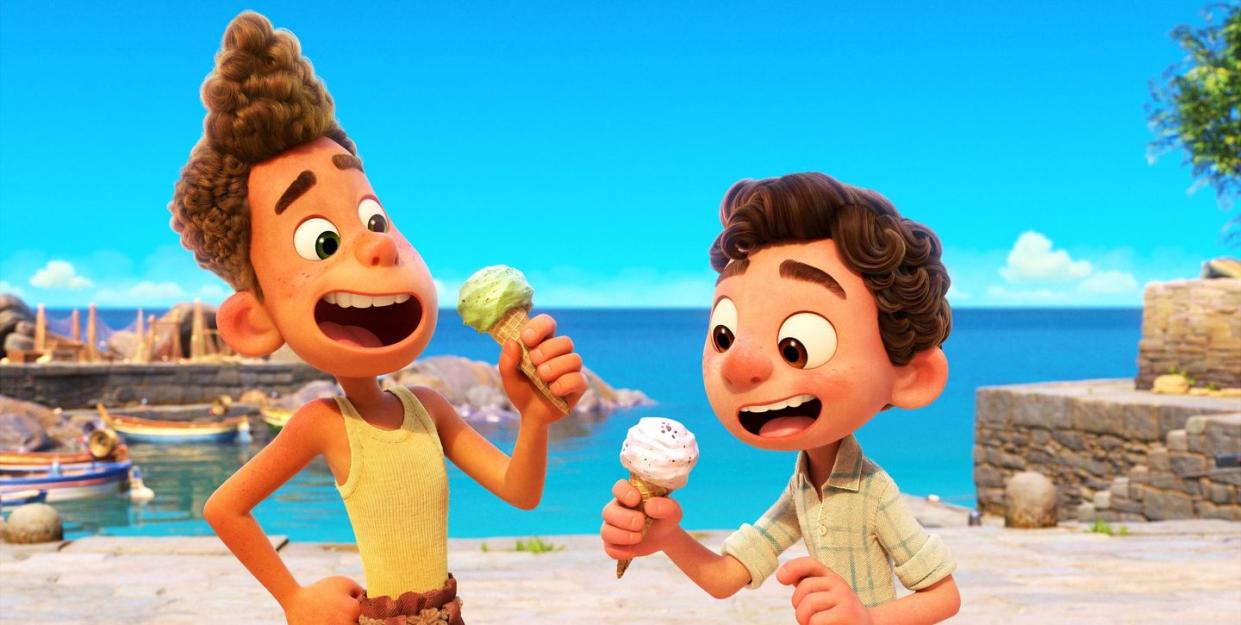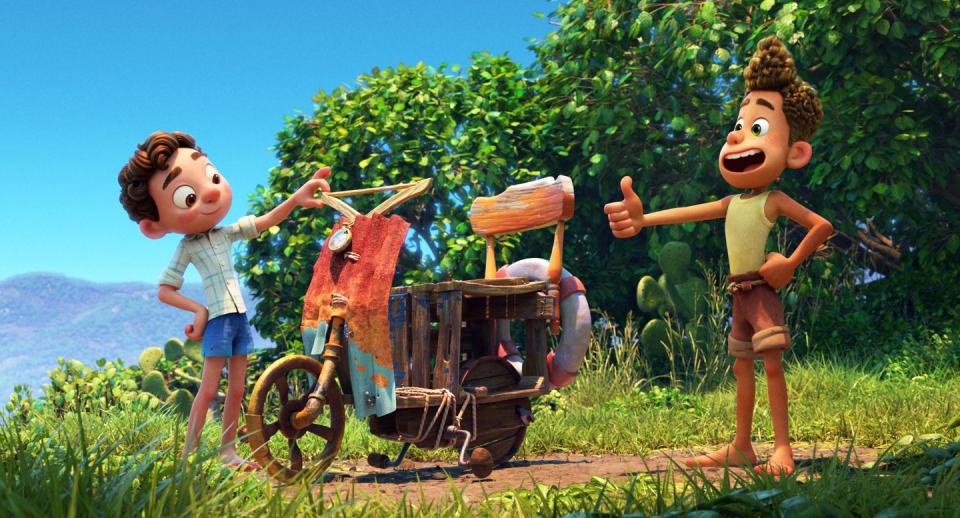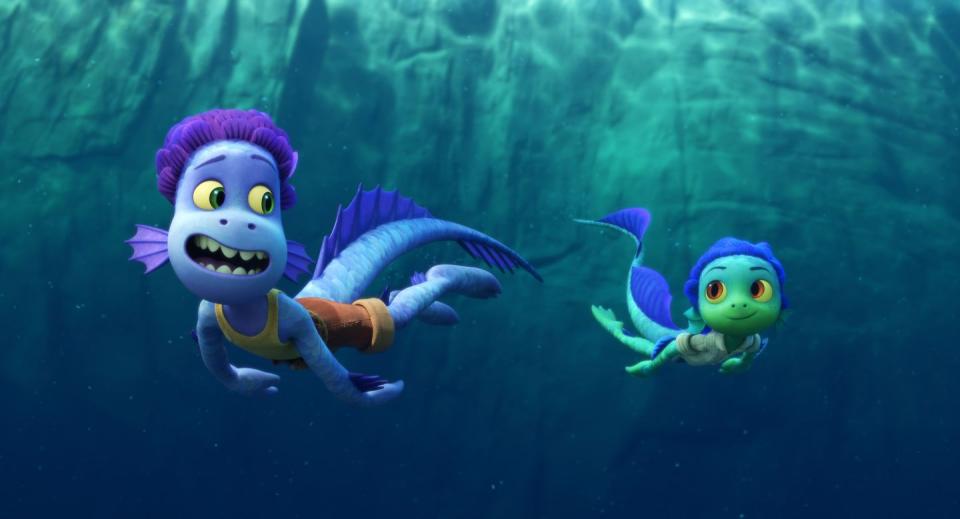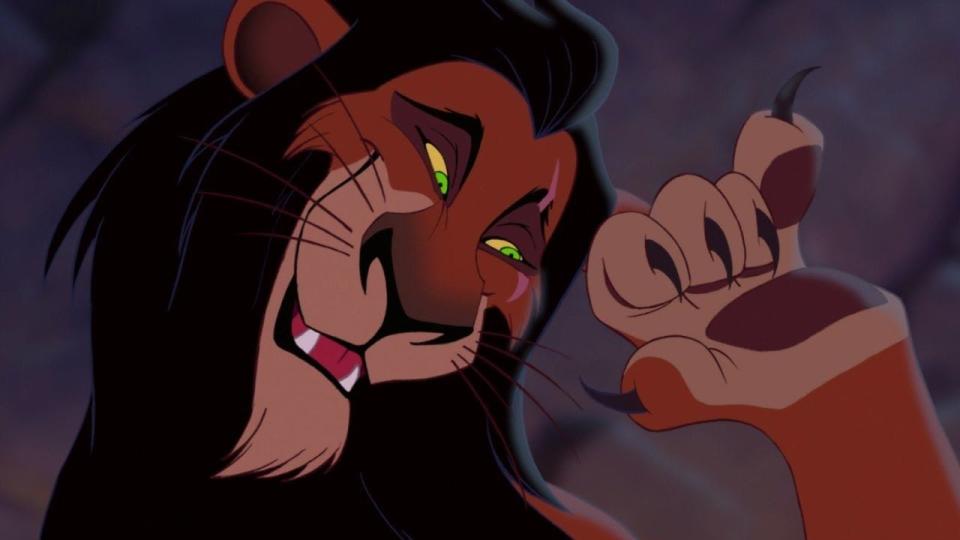Pixar's 'Luca' Isn't Officially Queer—But Here's How it Still Is, Anyway

- Oops!Something went wrong.Please try again later.
- Oops!Something went wrong.Please try again later.
“Hearst Magazines and Verizon Media may earn commission or revenue on some items through the links below.”
When the first trailer for Pixar's new movie Luca came out, it already gave off vibes of Call Me By Your Name.
You had the Italian seaside setting, a protagonist eerily resembling Timothée Chalamet and a story about a life-changing summer. All that was missing, besides a Sufjan Stevens score, was a romantic narrative as the bond between teenage sea monsters Luca and Alberto is only depicted as a friendship.
However, Luca and Alberto having to don human disguises to avoid persecution from the close-minded Portorosso villagers is analogous with the struggle felt by queer youths who have had to hide their identities to assimilate and avoid being othered.
According to director Enrico Casarosa in an earlier interview, the subtext picked up by audiences was unintentional. The goal for both him and producer Andrea Warren was to make a story about friendship and for the sea monsters to be an allegory for being a general outsider.

"We hoped that sea monsters could be a metaphor for all sorts of being different – like being a teen or pre-teen. That moment where you feel odd. There's all sorts of ways of feeling different," Casarosa said and to his credit, he is correct.
There are various ways for people, especially teenagers who have trouble fitting in, to feel ostracized. Along with its stunning visuals, the ambiguous interpretation of Luca helps it thrive because it can inspire plenty of engaging discussions. But there's no doubt for some viewers, including this writer, Luca is indeed a queer metaphor.
Luca and Alberto hiding their true forms in the ocean feels like the equivalent of hiding in the closet out of fear of discrimination. A fear that was felt when I was a pre-teen who was excluded by my classmates for simply being odd and keeping to myself.
I never had a friend like Alberto during that difficult time to remind me it's okay to be different. But as I grew older, I did finally get to take off my disguise, stepping 'out of the ocean' and onto the surface.
So, even if Luca doesn't reflect my pre-teen experience beat-for-beat, it still serves as a favourable ode to those who've felt – or feels – different because of their sexual/gender orientation. That includes those who have had their own Alberto guiding them through a daunting time in their life, even if their bond has remained strictly a comradeship.

Because its queer undertones remain just that though, Luca proves that Pixar and Disney still have ways to go with LGBTQ+ visibility in their animated features.
Given how Nimona, which would have been the first animated movie released by Disney with queer leads, got canned when Disney shut down Blue Sky Studios, who knows whether we'll see the day they intend to go beyond unintended subtext.
Until then, assuming that day eventually comes, instances like Luca and Alberto gradually 'coming out' as sea monsters and the titular protagonist from Mulan singing the unofficial LGBTQ+ anthem 'Reflection' as she wrestles with her gender identity remain the better reflections of the queer experience for audiences to latch onto.
Luca, at the very least, is an antidote to Disney's historical trend of showcasing queer-coded villains including Captain Hook, Ursula, and Scar. Antagonists who defy society's heteronormative conditions and possess plenty of memorable charisma, yet still perpetuate a link between queerness and evil that's been maintained since the days of the Hays Code.
The Code was a set of censorship guidelines that ran from the mid-1930s to the late 1960s before the inception of the Motion Picture Association of America. During the days of the Code, LGBTQ+ characters were only allowed to be introduced if their sexualities were presented at a subtextual level and if they were villains who faced defeat.

Given how Disney villains, including those from movies in Disney's Renaissance era, often met tragic fates, the effects of the Hays Code have still lingered.
By having its monsters serve as the heroes of the story, Luca serves as a small step away from that long and shoddy history. It might end up being one of many small steps for Disney the way movies like Mulan and Frozen were.
But regardless, it's still a small, yet meaningful, step.
Luca is available to watch now on Disney+.
You Might Also Like

